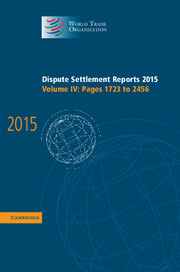Book contents
- Frontmatter
- Contents
- United States - Certain Country of Origin Labelling (COOL) Requirements Recourse to Article 21.5 of the DSU by Canada and Mexico (WT/DS384, WT/DS386): Reports of the Appellate Body
- United States - Certain Country of Origin Labelling (COOL) Requirements Recourse to Article 21.5 of the DSU by Canada and Mexico (WT/DS384, WT/DS386): Reports of the Panel
- Cumulative List of Published Disputes
United States - Certain Country of Origin Labelling (COOL) Requirements Recourse to Article 21.5 of the DSU by Canada and Mexico (WT/DS384, WT/DS386): Reports of the Panel
Published online by Cambridge University Press: 28 September 2017
- Frontmatter
- Contents
- United States - Certain Country of Origin Labelling (COOL) Requirements Recourse to Article 21.5 of the DSU by Canada and Mexico (WT/DS384, WT/DS386): Reports of the Appellate Body
- United States - Certain Country of Origin Labelling (COOL) Requirements Recourse to Article 21.5 of the DSU by Canada and Mexico (WT/DS384, WT/DS386): Reports of the Panel
- Cumulative List of Published Disputes
Summary
INTRODUCTION
Complaints by Canada and Mexico
This compliance dispute concerns the challenges by Canada and Mexico of the measure taken by the United States in 2013 to comply with the Dispute Settlement Body (DSB) recommendations and rulings in United States – Certain Country of Origin Labelling (COOL) Requirements (DS384 and DS386).
On 10 June 2013, Canada and Mexico reached an understanding with the United States in “Agreed Procedures under Articles 21 and 22 of the Dispute Settlement Understanding” (Sequencing Agreement). According to paragraph 2 of this Sequencing Agreement, Canada and Mexico were not required to hold consultations with the United States before requesting the establishment of a panel under Article 21.5 of the Understanding on Rules and Procedures Governing the Settlement of Disputes (DSU).
Panel Establishment and Composition
On 19 August 2013, Canada and Mexico requested the establishment of a panel pursuant to Articles 6 and 21.5 of the DSU, Article 14 of the TBT Agreement, and Article XXIII of the GATT 1994, with standard terms of reference as set out in Article 7.1 of the DSU.
At its meeting on 25 September 2013, the DSB referred this dispute to the original panel if possible, in accordance with Article 21.5 of the DSU.
The Panel's terms of reference are the following:
To examine, in the light of the relevant provisions of the covered agreements cited by the parties to the dispute, the matter referred to the DSB by Canada in document WT/DS384/26 and by Mexico in document WT/DS386/25, and to make such findings as will assist the DSB in making the recommendations or in giving the rulings provided for in those agreements.
In accordance with Article 21.5 of the DSU, the Panel was composed on 27 September 2013 as follows:
Chairperson: Mr Christian Häberli
Members: Mr Manzoor Ahmad
Mr João Magalhães
Australia; Brazil; Canada (for DS386); China; Colombia; the European Union; Guatemala; India; Japan; the Republic of Korea; Mexico (for DS384); and New Zealand reserved their rights to participate in the Panel proceedings as third parties.
- Type
- Chapter
- Information
- Dispute Settlement Reports 2015 , pp. 2019 - 2430Publisher: Cambridge University PressPrint publication year: 2016



